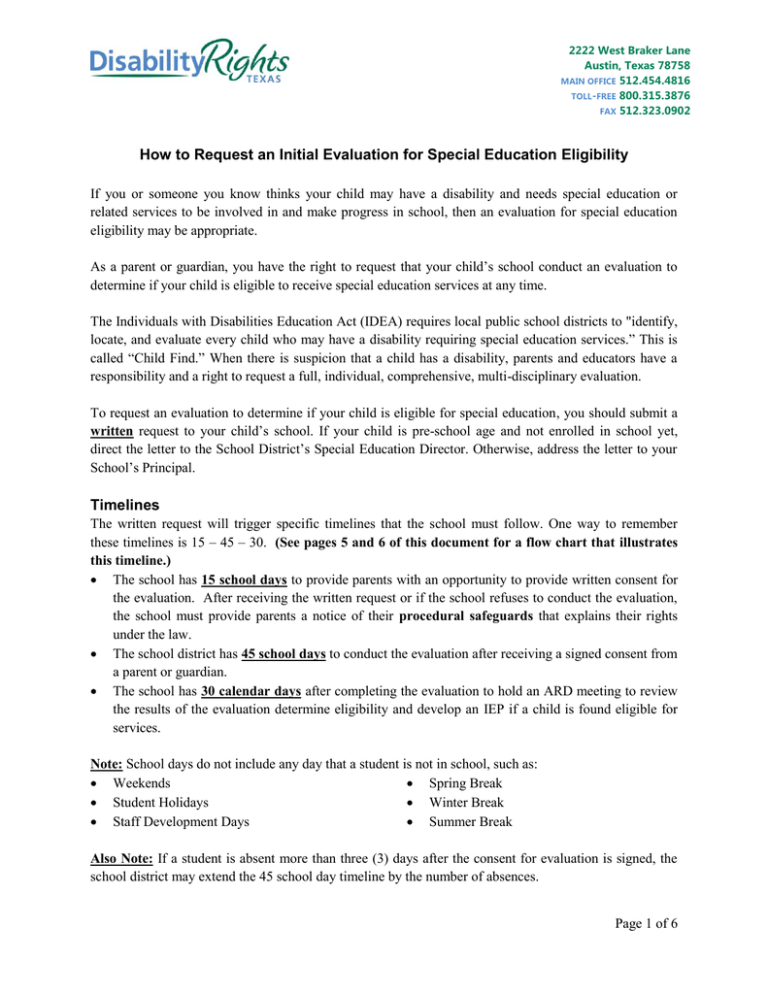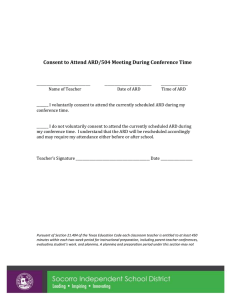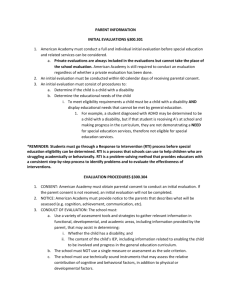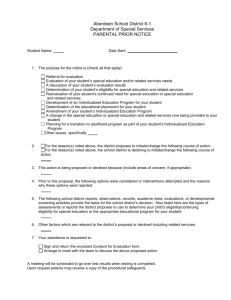How to Request an Initial Evaluation for Special Education Eligibility
advertisement

2222 West Braker Lane Austin, Texas 78758 MAIN OFFICE 512.454.4816 TOLL-FREE 800.315.3876 FAX 512.323.0902 How to Request an Initial Evaluation for Special Education Eligibility If you or someone you know thinks your child may have a disability and needs special education or related services to be involved in and make progress in school, then an evaluation for special education eligibility may be appropriate. As a parent or guardian, you have the right to request that your child’s school conduct an evaluation to determine if your child is eligible to receive special education services at any time. The Individuals with Disabilities Education Act (IDEA) requires local public school districts to "identify, locate, and evaluate every child who may have a disability requiring special education services.” This is called “Child Find.” When there is suspicion that a child has a disability, parents and educators have a responsibility and a right to request a full, individual, comprehensive, multi-disciplinary evaluation. To request an evaluation to determine if your child is eligible for special education, you should submit a written request to your child’s school. If your child is pre-school age and not enrolled in school yet, direct the letter to the School District’s Special Education Director. Otherwise, address the letter to your School’s Principal. Timelines The written request will trigger specific timelines that the school must follow. One way to remember these timelines is 15 – 45 – 30. (See pages 5 and 6 of this document for a flow chart that illustrates this timeline.) The school has 15 school days to provide parents with an opportunity to provide written consent for the evaluation. After receiving the written request or if the school refuses to conduct the evaluation, the school must provide parents a notice of their procedural safeguards that explains their rights under the law. The school district has 45 school days to conduct the evaluation after receiving a signed consent from a parent or guardian. The school has 30 calendar days after completing the evaluation to hold an ARD meeting to review the results of the evaluation determine eligibility and develop an IEP if a child is found eligible for services. Note: School days do not include any day that a student is not in school, such as: Weekends Spring Break Student Holidays Winter Break Staff Development Days Summer Break Also Note: If a student is absent more than three (3) days after the consent for evaluation is signed, the school district may extend the 45 school day timeline by the number of absences. Page 1 of 6 Special Note about Evaluation Requests at the End of a School Year: It is important for parents to request an evaluation as soon as they suspect that a student may have a disability and require special education services, because if an evaluation is requested late in a school year, you may have to wait until the beginning of the next school year for the evaluation to be completed. However, if the evaluation is almost completed before the school year ends, the school district may be required to complete the evaluation and provide you with the report during the summer break. If a parent provides the school with written consent for the evaluation less than 45 schools days, but at least 35 school days before the last instructional day of the school year, the evaluation must be completed and the report provided to the parent by June 30th of that school year. Then, not later than the 15th school day of the following school year, the ARD meeting to review the results of the evaluation and determine eligibility must be conducted. Written Request In the letter you should briefly describe your concerns and why you feel your child may need special education service. Remember, this can include social and behavioral concerns as well as academic issues. Also, when writing the letter you should also state that any general education interventions (such as RtI) that the school would like to try should not slow down the timelines established under IDEA. (See sample letter on page 4 of this document.) Response to Intervention (RtI) Response to Intervention, often called RtI, is a general education pre-referral process to help children who are having difficulty learning and achieving at grade level. RTI is designed to give students additional academic support before the school district determines if they should be referred for a comprehensive special education evaluation. IDEA does not require the use of RtI but says that a local school district may use RtI as “part” of the process. On January 21, 2011, a memorandum from the Office of Special Education Programs, US Department of Education, to State Directors of Special Education stated that a Response to Intervention (RtI) process cannot be used to delay or deny an evaluation under the IDEA. So, a school district cannot require that a student complete RtI before it conducts an evaluation for special education eligibility. Additionally, regardless of where the child is in an RTI process, the IDEA regulations give parents the right to request an evaluation for special education services at any time. After the Evaluation is Completed When the evaluation is completed, the school will contact you to schedule an ARD meeting. The Admission, Review and Dismissal (ARD) committee meets at least once a year to develop your child’s IEP. You are a member of your child’s ARD committee. The first ARD meeting must be held no more than 30 calendar days after completion of the initial evaluation. The committee will determine whether, based on the evaluation, a student is eligible to receive special education services. If the ARD committee determines that your child has a disability and needs special education services, you will be asked to give your written consent for the school to provide special education. The consent you gave to have your child evaluated is not also consent for services. The ARD committee will then develop your child’s individual education program (IEP). Page 2 of 6 Procedural Safeguards Notice After you request an evaluation for special education eligibility, the school district must give you written information about their rights and options for resolving disputes. Texas schools use a document developed by the Texas Education Agency (TEA) called “Notice of Procedural Safeguards: Rights of Parents of Students with Disabilities.” The school district must give you this notice in the language you usually speak at home. If you cannot read or write, the school must give you the information orally, as a recording, in Braille or in any other way that you can understand. The school officials must keep written records to show they gave you this notice. If you do not understand the meaning of the document, they must explain it to you. If the School District Refuses to Conduct an Evaluation or After Evaluation, Concludes a Student is Not Eligible for Special Education Services If a school district refused to conduct an evaluation, or you disagree with the evaluation, you may be entitled to an independent evaluation at the school district's expense. Parents also have the option to pay for an evaluation by a professional of their choice. As part of the dispute resolution process parents also have the right to request mediation, file a state complaint, or file for a due process hearing. The IDEA requires states to have procedures in place to assist parents in resolving disputes through mediation. Mediation is a voluntary process that allows parents and school districts to explain their positions to an impartial mediator who helps to facilitate communication and assists the parents and school to agree to resolve their disagreement. Mediation is free to the parents and school district and the costs paid for by the TEA. The state complaint process requires a parent to file a letter with the state education agency outlining a violation of the IDEA (or its regulations). A copy of the complaint must be furnished to the school district at the time the complaint is filed with the SEA if the violation occurred in the school district. The IDEA provides for the right to challenge a school district’s decision through a due process hearing. A parent may request a form from the TEA to file an IDEA due process complaint. For information about complaints, mediation and due process hearings in Texas, you can go to the TEA website, www.tea.state.tx.us/special.ed/medcom/pubs.html, and download the “TEA Dispute Resolution Guide.” Or you can call the TEA parent information line at 1-800-252-9668. Page 3 of 6 SAMPLE LETTER FROM PARENT/GUARDIAN TO SCHOOL REQUESTING ASSESSMENT Date Name of principal Name of school Address of school Dear (name of principal): I am the parent of (name of student), a student at your school. My child’s teacher and I have concerns that my child may have a disability and is in need of special education services. I am requesting that my child be assessed for both, special education under the Individuals with Disabilities Education Act (IDEA), as well as whether s/he has a disabling condition under Section 504 of the Rehabilitation Act [or] I am the parent of (name of child), a child that resides in your district that is or will be 3 years old on (birth date). I believe my child may have a disability and is in need of special education services. I am requesting a full individual evaluation of my child. I believe testing is needed in the area(s) of: (list areas of suspected disability needing testing). I am also requesting that any general education interventions, such as Response to Intervention (RtI), that the school would like to try not slow down the timelines established for the evaluation process. I understand that I can expect to receive a response to my request within 15 school days of your receipt of this request and that I will be required to give my written consent for the evaluation at that time or I will receive notice of my procedural safeguards that explains my rights under the law. I look forward to receiving your response and the consent form as soon as possible so that we can proceed. I also understand that the evaluation must be completed within 45 school days from the date the school district receives signed consent for evaluation. [or] I also understand that because I consented to the evaluation least 35 school days before the last instructional day of the school year, but less than 45 schools days, the evaluation must be completed and the report provided to me by June 30th. Then, not later than the 15th school day of next school year, the ARD committee will meet to review the results of the evaluation and determine eligibility. Please contact me within five days of this request to sign consent forms to evaluate my child. Thank you for your help. Sincerely, Your name Your address Your telephone number Your e-mail address (optional) Page 4 of 6 New Timeline for the Special Education Process (15-45-30) Initial Request for Referral made by Parent Parent makes a written request to school for an evaluation to determine special education eligibility Within 15 School Days of written request Consent and Notice of Evaluation or Prior Written Notice given to Parent Schools must provide a parent with an opportunity to provide written consent for the evaluation or if the school refuses to conduct the evaluation, the school must provide parent a notice of their procedural safeguards that explain their rights under the law. Full Initial Individual Evaluation (FIIE) Completed Within 45 School Days of receipt of written signed consent (if a student is absent more than 3 days, a school districts can make adjustments to the 45 school day timeline) Assessing all areas of suspected disability Notice of ARD Meeting Within 30 Calendar Days Provided to parent at least 5 days prior to ARD meeting ARD Meeting and Consent for Initial Placement To determine eligibility for special education, development of IEP and determine placement NOTE: School day does not include any day a student is not in school including: student holidays (thanksgiving, winter, spring and summer breaks), weekends, and staff development days. Page 5 of 6 Special Evaluation Timeline Provisions for End of School Year Initial Request for Referral made by Parent Parent makes a written request to school for an evaluation to determine special education eligibility Within 15 School Days of written request Consent and Notice of Evaluation or Prior Written Notice School provide parent with an opportunity to provide written consent for the evaluation or if the school refuses to conduct the evaluation, the school must provide parent a notice of their procedural safeguards that explains their rights under the law. If a parent provides the school with written consent for the FIIE at least 35 school days before the last instructional day of the school year but less than 45 schools days. By June 30th following the end of the school year Full Initial Individual Evaluation Completed and provided to parent (by June 30) Assessing all areas of suspected disability No later than the 15th school day of the following school year ARD Meeting To determine eligibility for special education, development of IEP and determine placement Page 6 of 6





